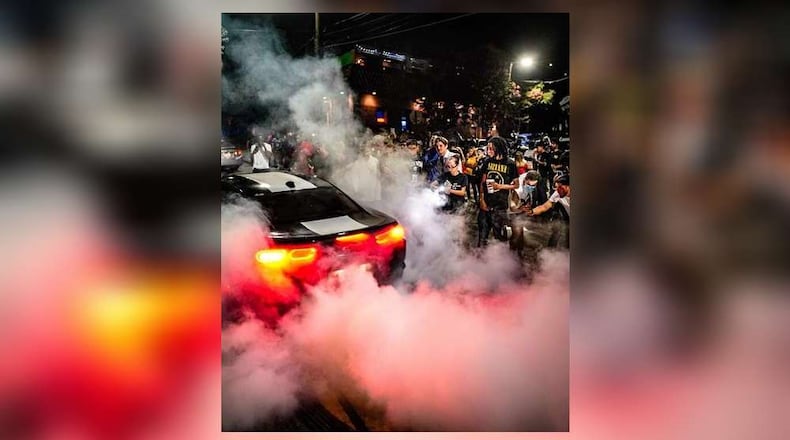The Atlanta Police Department changed its tactics to combat street racing over the weekend, top officials said, a step aimed at addressing growing concerns from residents and business owners about safety and noise on the city’s streets.
In a presentation to members of the Atlanta City Council on Monday afternoon, interim Chief Rodney Bryant said officers issued 202 citations for reckless driving, laying drag and other traffic offenses. That’s double what the department gave out the previous weekend, though many cases are not moving forward while the city’s court is closed due to the pandemic.
“Our strategy has changed some as of this week,” Bryant said to the Council’s public safety committee. Rather than wait for a neighbor or bystander to call 911, police are taking a more proactive approach. “What we’re doing now is going into areas that we clearly recognize are the favorite spots for some of these drag racers and some of these speedsters.”
“Street racing," a catch-all term that often involves drivers loudly driving in tight circles amidst a cheering crowd, has been a concern among Atlanta’s residents and officials for years, but it saw an uptick this year. They are largely coordinated through social media, drawing spectators and others to video the stunts.
Over the summer and into the fall, many residents — especially in Buckhead, Midtown and Old Fourth Ward — have grown increasingly fed up and worried about their safety on the roads.
At the start of the committee meeting Monday, councilmembers heard over an hour and a half of comments from residents who urged the city to do more to stop the street racing. Words like “unsafe,” frightening" and “lawlessness” came up multiple times.
“We are so afraid someone is going to get killed," one Buckhead resident said.
Bryant presented data showing that 911 calls that mentioned “racing,” “drag” or “donuts” have increased steadily since June, with 551 calls last month that included those terms. In just the first 11 days of October, APD received 200 calls that mentioned either “racing,” “drag" or “donuts.”
Police have made nearly 500 arrests this year for charges including racing, laying drag or reckless driving, Bryant said. Under state law, officials said, they are not able to impound vehicles involved in street racing.
Bryant said the city may also see a drop in street racing after the city’s court reopens and offenders face penalties for the traffic violations. Atlanta Municipal Court Chief Judge Christopher Portis told the councilmembers that there is no set date for when the court might reopen. Police said street-racing offenses can result in up to six months in jail and a $1,000 fine.
City Council President Felicia Moore pointed out that street racing is not unique to Buckhead or Midtown.
“I don’t think there’s a district that hasn’t seen it,” she said.
Over the weekend, Moore posted on social media and urged street racers to stop.
“And, at the same time I will do all I can to stop you,” she wrote.
During Monday’s meeting, Bryant also cleared up rumors that started online after a pedestrian was struck and killed by a car in Buckhead over the weekend. APD’s initial investigation has indicated the crash was not the result of street racing.
Councilman Amir Farokhi, whose Midtown and downtown district is home to several street racing hotspots, said laws to combat the issue are in place.
“The challenge has been enforcement,” Farokhi said in an interview. “The Council and the city are working really hard to solve this issue because it’s not acceptable. It’s not tenable. And every resident deserves better.”
He sent a letter to the city’s administration Thursday urging officials to ramp up enforcement and lobby for changes in the state law that could strengthen penalties.
About the Author
Keep Reading
The Latest
Featured


